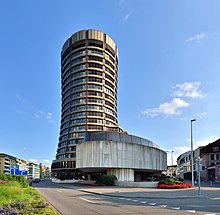Basel Committee
The Basel Committee on Banking Supervision ( English Basel Committee on Banking Supervision, BCBS , shorter than the Basel Committee called) was founded in 1974 by the central banks and banking supervisory authorities of the G10 countries in response to the bankruptcy of Herstatt Bank founded and other banks. It is based at the Bank for International Settlements (BIZ, Bank for International Settlements, BIS ) in Basel . The committee is institutionally independent of the BIS. However, he is supported logistically and technically by her.
functionality
The committee meets every three months. Its main task is to contribute to the introduction of high and, if possible, uniform standards in banking supervision. To this end, the committee prepares guidelines and recommendations on which the supervisory authorities of a country can rely. These guidelines are not legally mandatory, but merely represent recommendations that can be implemented in national law. In general, however, it is assumed that the recommendations will be adopted, as the guidelines emerge in discussions with banks and regulators around the world.

47 ° 32 ′ 53.1 ″ N , 7 ° 35 ′ 30.3 ″ E
Members of the Basel Committee
Over time, the circle of members who belong to the Basel Committee on Banking Supervision has expanded.
In addition to representatives of the ten leading industrial nations ( G10 countries ), the committee now also includes representatives from Argentina, Korea, Australia, Luxembourg, Mexico, Brazil, Russia, China, Saudi Arabia, Singapore, South Africa, Hong Kong, Spain, India and Indonesia and Turkey. In 2009 alone, the Basel Committee accepted seven additional members in March and seven more new members in June.
Relationship to German banking supervision
The pronouncements of the Basel Committee are not legally binding. It is only a matter of formulating guidelines and recommendations.
As a rule, however, the recommendations are incorporated into national law in an appropriate form. This can be done through an EU directive and an implementation law in Germany. However, since Basel III and the CRR, implementation has increasingly taken place through a directly legally binding European regulation, in which case national implementation is no longer applicable.
tasks and goals
The Basel Committee is a forum for regular cooperation between the members. It thus contributes to improving the quality and understanding of banking supervision worldwide through:
- Exchange of information
- Improvement of supervisory techniques
- Recommendation of minimum regulatory standards
In this way, the Basel Committee is helping to strengthen the international banking system. It closes existing gaps in the international banking supervision system.
Equity agreements
Since 1988, the Basel Committee has published three equity capital agreements, briefly referred to as Basel I to Basel III:
- Basel I : published in 1988.
- Basel II : published in 2004, binding in the EU from 2007.
- Basel III : published in 2010, gradually introduced in the EU from 2013.
- Finalization of Basel III (also " Basel IV "): Significant expansions of Basel III decided at the end of 2017. Implementation in the EU from 2019 (including CRR 2 and CRD IV).
literature
- Markus Krajewski: International Business Law . 3. Edition. CF Müller, Heidelberg 2012, ISBN 978-3-8114-9666-8 , chap. § 5 International Monetary and Financial Law, Section IV. The Bank for International Settlements (BIS), p. 258-263 .
Web links
Individual evidence
- ↑ Markus Krajewski, Rn. 880.
- ↑ Markus Krajewski, Rn. 879
- ↑ Markus Krajewski, Rn. 888
- ↑ Bank for International Settlements (Ed.): Report on the progress made in the implementation of the Basel framework . 2014, ISBN 978-92-9131-374-7 ( bis.org [PDF; 251 kB ; accessed on August 13, 2015]).
- ^ History of the Basel Committee and its Membership. Retrieved October 1, 2009 .
- ^ Expansion of membership announced by the Basel Committee. Retrieved October 1, 2009 .
- ↑ Basel Committee broadens its membership. Retrieved October 1, 2009 .
- ↑ https://www.bis.org/press/p171207.htm